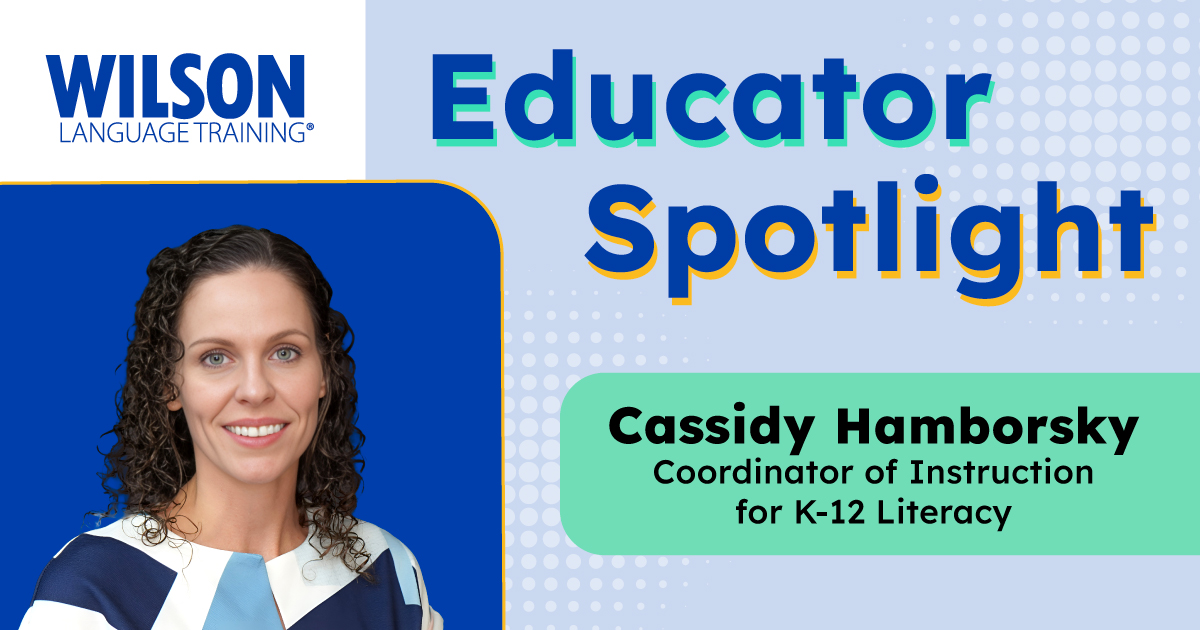
Literacy instruction is a top priority at Worcester County Public Schools in Maryland, and Cassidy Hamborsky has been at the forefront of expanding Structured Literacy practices across the district. Her commitment to data-driven decision-making and collaborative approach to implementation ensure that both teachers and students have the support they need to succeed. Thanks to Cassidy for sharing her journey with Wilson® programs and the impact they’ve had on students and educators alike.
My name is Cassidy Hamborsky, and I am the Coordinator of Instruction for K-12 Literacy at Worcester County Public Schools. We’ve been implementing Fundations® since 2018, and, in my tenure, I’ve worked to expand its use in Pre-K, as well as to integrate Just Words® and the Wilson Reading System® for our older students struggling with reading.
I’ve been in education for 18 years, all in the same district. I started as a fifth-grade teacher, then moved to teaching seventh-grade English before transitioning into a curriculum resource teacher role and eventually administration. My focus shifted to Structured Literacy when I began my current role in 2019-2020, a year we all remember due to the pandemic.
When schools shut down, I recognized that ensuring continuity for our youngest readers was crucial and encouraged teachers to prioritize Fundations in their virtual instruction. As I delved deeper, I discovered that Fundations is prescriptive, and teaching it effectively requires a deep understanding of its principles. That realization led me to reach out to our literacy advisor for guidance on reteaching strategies and mastery tracking. With her support, we built a districtwide framework for tracking Unit Test data and ensuring that reteaching was happening where needed.
One story that stands out is about a veteran kindergarten teacher who was initially skeptical about using Fundations. She believed more time should be devoted to play-based learning. Instead of dismissing her concerns, I invited her to become a Fundations facilitator. Through training and hands-on experience, she saw the program’s impact firsthand. Today, she’s a model instructor—teachers visit her classroom to observe her lessons. Regardless of schedule disruptions, she prioritizes Fundations every day because she knows its value. Her transformation highlights the power of professional learning and firsthand experience.
Many new teachers come from programs where they are used to designing their own lessons from scratch. When they enter a school with a structured curriculum like Fundations, it can be an adjustment. We work to help them understand that implementing a high-quality curriculum with fidelity is just as critical as creative lesson planning. Wilson’s built-in supports, like Wilson Academy® and FUN HUB®, provide valuable resources for teachers to deepen their knowledge and refine their instruction.
Wilson has a standard of excellence that is evident in everything they do. Their mission is clear, and every program and professional learning opportunity aligns with it. They prioritize implementation fidelity and sustainability. As an administrator, I appreciate the built-in support systems for teachers and the structured plans for sustaining implementation in the long term.
When I started my role, our district’s system of supports for students struggling with literacy proficiency was being built. Implementing Fundations as a Tier 1 program helped, but we still had students needing additional support. We began screening students using the DIBELS assessment alongside our Fundations data, which helped us identify both student needs and implementation gaps. This data-driven approach allowed us to make informed decisions, provide targeted professional development, and ensure that students were receiving appropriate interventions.
Start small and focus on what’s most important. You can’t implement everything at once, even though you might want to. Building teacher motivation and understanding the “why” behind Structured Literacy are essential. Respect teachers as professionals—when they see the impact of high-quality instruction, they become its strongest advocates.